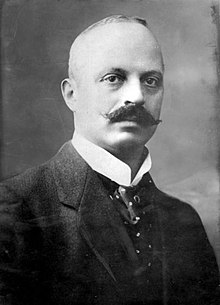Charles Ruijs de Beerenbrouck
|
Jonkheer Charles Ruijs de Beerenbrouck |
|
|---|---|
 |
|
| 28th and 31st Prime Minister of the Netherlands | |
|
In office 10 August 1929 – 26 May 1933 |
|
| Monarch | Wilhelmina |
| Preceded by | Dirk Jan de Geer |
| Succeeded by | Hendrikus Colijn |
|
In office 9 September 1918 – 4 August 1925 |
|
| Monarch | Wilhelmina |
| Preceded by | Pieter Cort van der Linden |
| Succeeded by | Hendrikus Colijn |
| Personal details | |
| Born |
Charles Joseph Maria Ruijs de Beerenbrouck 1 December 1873 Roermond, Netherlands |
| Died | 17 April 1936 (aged 62) Utrecht, Netherlands |
| Political party | RKSP |
| Spouse(s) | Maria van der Heyden |
| Children | 3 |
| Alma mater | Utrecht University |
| Occupation | Lawyer |
| Religion | Roman Catholic |
| Signature |  |
Jhr. Charles Joseph Maria Ruijs de Beerenbrouck (1 December 1873 – 17 April 1936) was a Dutch nobleman and Prime Minister of the Netherlands from 1918 to 1925 and again from 1929 to 1933. He was a member of the Roman Catholic RKSP.
Charles Joseph Maria Ruijs de Beerenbrouck was born on 1 December 1873 in Roermond, a town with a Bishop's see in the province of Limburg, in the very south of the Netherlands. Born into an aristocratic family, he grew up in a predominantly Roman Catholic community and went to school in Maastricht and in The Hague. He attended the Utrecht University and in 1895 Ruijs de Beerenbrouck obtained his master's degree in law at the Leiden University.
He was the son of Gustave Louis Marie Hubert Ruijs de Beerenbrouck (1842–1926), Minister of Justice in the government-Mackay (founder of the labor and social laws first) and later governor of Limburg (1918).
He started his career in 1896 as a lawyer in Maastricht. In 1899 Ruijs de Beerenbrouck became a member of the Maastricht City council and in 1905 he was elected to the House of Representatives. Ruijs de Beerenbrouck remained a city councillor and a member of parliament until 16 May 1918, when he became Queen's Commissioner of the province of Limburg (in the province of Limburg usually called "Gouverneur" (governor)).
...
Wikipedia
